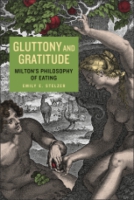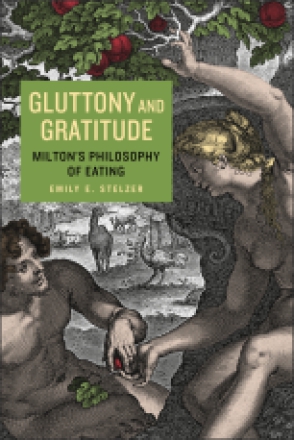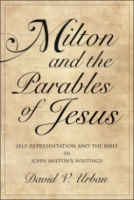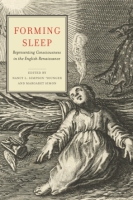Gluttony and Gratitude
Milton’s Philosophy of Eating
Emily E. Stelzer
“Quite a good book of its kind, its particular virtue being the scope of its inquiry, which extends from heaven to hell and from the garden of Eden to the fallen present, in the process offering an integrated overview of the role of dietary concerns in Milton’s work.”
- Description
- Reviews
- Bio
- Table of Contents
- Sample Chapters
- Subjects
“Quite a good book of its kind, its particular virtue being the scope of its inquiry, which extends from heaven to hell and from the garden of Eden to the fallen present, in the process offering an integrated overview of the role of dietary concerns in Milton’s work.”
“This book will provide a valuable introduction to the theological and cultural traditions behind Paradise Lost that will be most helpful to readers who are relatively new to medieval and Renaissance studies, and a provocative challenge to the assumptions of senior scholars.”
“Stelzer’s study throughout provides interpretive payoffs regarding diverse passages and issues in Paradise Lost, and the fourth and most compelling chapter sensitively explores the rich interplay between eating and other activities for the angels and unfallen humankind.”
Emily E. Stelzer is Assistant Professor of Literature and Program Director for English and Great Texts at Houston Baptist University.
Contents
Acknowledgments
Abbreviations
A Note on the Text
Introduction: “Unsavory Food Perhaps”
1. Patristic, Medieval, and Early Modern Views of Gluttony
2. An Anatomy of Gluttony in Paradise Lost
3. Scatology and Devilish Glut in Paradise Lost
4. Perfect Consumption, the Food of the Gods, and the Great Chain of Eating
5. The Food of Love, the Paradise Within, Augustinian Triads, and the Body Resurrected
6. The Temperate Poet and “This Flying Steed Unrein’d”
Notes
Bibliography
Index
From the Introduction: “Unsavory Food Perhaps”
In the opening lines to a section of one of the lengthiest and most enduring poems in the English language, a sage and serious poet wrote of man’s first disobedience. He retold the story of the human race’s first parents and of the eating of forbidden fruit, an act bringing death, woe, and corruption into paradise. It was the close of the fourteenth century. The poet was John Gower, and he was writing about gluttony.
The sixth book of Gower’s Confessio Amantis, on gluttony, is one of many textual artifacts representative of a historically prominent yet all-but-forgotten tradition regarding the story of Adam and Eve. The tradition deserves note not simply because it has been neglected but because it has had influence, and one of the most sophisticated and imaginative adaptations of this tradition may be found in Paradise Lost. Familiar with Gower’s Confessio Amantis, as with many other late antiquity, medieval, and early modern works depicting or assuming a gluttonous fall from a state of innocence, John Milton had no dearth of source material at his disposal when he considered the Fall in his own poetry. In using this material, Milton constructed a philosophy of eating that explores not only the expansive boundaries of gluttony but also the outer limits of knowledge and the space governed by charity.
The pages that follow demonstrate how Milton pays tribute to and builds upon the tradition of the gluttonous Fall— a tradition Milton acknowledges directly in his prose and incorporates into his poetry in a significant way, and one affecting the entire created cosmos of Paradise Lost. As the angel Raphael leads Adam to discern, what begins as a rule for eating bears upon Raphael’s guidelines for the pursuit of knowledge — for example, “be lowly wise”— and for interacting with human companions — for example, “In loving thou dost well, in passion not” (PL 8.173, 8.588). A philosophy of eating takes shape as the physical sphere of Milton’s cosmopoiesis becomes enfolded in and digested by intellectual and moral spheres, and as gluttony’s role in the Fall bears upon the ontological, epistemological, and ethical concerns of the poem. In Paradise Lost, eating fundamentally affects being, knowing, and doing. These three categories— the physical, the intellectual, and the moral — are interconnected areas of personal growth for Adam and Eve, making Eden the soil for extraordinary transformation. Thus by turns Milton describes the prelapsarian scale of nature in Paradise Lost, first as one of physically metabolic and symbiotic processes, then as one of inquiry, dialectic, and contemplation characterized by self-knowledge and self-restraint, and ultimately as a scale of love. From the tradition of the gluttonous meal, Milton proceeds to test the confines of temperance and the extravagances of charity. In doing so, Milton envisions the Chain of Being as a path toward God involving body, mind, and will, or physical, intellectual, and moral activity. As I will argue, this path is still partly accessible to Adam and Eve after the Fall and becomes a key part of Milton’s project in justifying the ways of God.
Attending to the links among the physical, intellectual, and moral spheres of Paradise Lost, I have situated this project in the territory of the medieval synthesizers, and in some respects this book is about a “medieval Milton,” about how several predominantly late antiquity and medieval ideas and traditions inform Paradise Lost. John Mulryan has encouraged scholars “to study Milton, not as a medieval writer, but as a thinker and as a poet who was profoundly aware of the rich heritage of the medieval tradition, and who was perfectly capable of picking and choosing from its history, philosophy, theology, art, and literature, without necessarily accepting its version of Christianity or civil government.” Gluttony once headed the list of deadly sins, and patristic and medieval theologians (e.g., John Cassian, Augustine of Hippo, and Gregory the Great) and medieval poets (e.g., Dante Alighieri, John Gower, and Geoffrey Chaucer) have variously promoted a complex and broad definition of gluttony and the story of a gluttonous Fall. Milton’s use of this tradition also pulls from interrelated medieval concepts and poetic features, including triadic structuring, emphasis on the will in moral law, and the cultivation of a relationship between eating and poetics. The roots of these concepts and features were established much earlier and may be found in Jewish and Christian sacred Scriptures and in ancient Greek and Roman philosophy. Their influence persists in and beyond the early modern period. Milton’s peculiar treatment of gluttony in Paradise Lost depends on Plato, Aristotle, Augustine of Hippo, Evagrius of Pontus, John Cassian, Gregory the Great, Dante, Chaucer, Gower, and Edmund Spenser, and the qualities and consequences of gluttony as once perceived cast new light on the drama of Paradise Lost.
Gluttony has a literal, significant role in the Fall in Paradise Lost, but the full significance of this narrative is lost if gluttony is not also acknowledged as a symptom and symbol of more abstract corruption. Gluttony would not be so formidable if it had no relation to the mind and the will; it would not be so vivid if it were not for the body. Accordingly, this book both examines the gluttonous and gustatory metaphors of Paradise Lost and analyzes the philosophic ideas at stake in an account of a literally gluttonous Fall. I argue that gluttony plays a critical if not obvious role in the Fall in this poem, and that this vice as understood by Milton was more complex, more intellectual, and more consequential than has been expressed before now.
This is not, then, a book on temperance in the narrow and austere sense in which that virtue is sometimes considered. Ever the classicist, Milton thought of temperance in terms of the ancient Greek concept of sophrosynē, a virtue that signifies soundness of mind, pleasant restraint, self-awareness, and just moderation, but one that does not represent — at least not for Aristotle in the Nicomachean Ethics — the pursuit of an objectively stable ethical mean. Although commonplace expressions of the golden mean often suggest that virtue is a stable target, Milton’s concept is more sophisticated and closer to Aristotle’s explanation of the virtuous mean as variant and dependent on occasion, situation, and persons involved. For Aristotle, “the desiring part of a temperate person needs to be in harmony with reason, for the aim to which both look is the beautiful, and the temperate person desires what one ought, as one ought, when one ought, which is what reason also prescribes.” While Aristotle suggests a somewhat precise but moving target, Milton emphasizes both the need for discernment and the danger of being too “nice” (e.g., PL 4.241, 5.433). For both Milton and Aristotle, one cannot pinpoint an exact and static location of virtue from which, at any given moment, any deviation of excess or defect is vicious; in Milton especially, temperance lies in a moderate middle ground that permits fluctuation and is governed by both reason and charity. For example, in Paradise Lost sometimes zealous action is laudable as a healthy superflux of courage, which nevertheless is not as extreme as rashness; sometimes restraint or standing is praised, which is certainly not cowardly but does not seem to be at all times a full expression of the active virtue of courage, either. Abdiel is the model angel who demonstrates both active zeal and patient standing at critical moments. His self- and situational awareness make him an exemplary practitioner of sophrosynē.
Temperance as sophrosynē is philosophical and introspective; it requires self-knowledge that in turn facilitates discursive reasoning. It includes knowing one’s dignity as well as one’s proper limits. When in book 8 of Paradise Lost Adam tells Raphael how he asked God for a human companion, the story that unfolds is a test of self-knowledge that leads to a fit conversational partner. Adam must first articulate his position as intellectually superior to the beasts:
Of fellowship I speak
Such as I seek, fit to participate
All rational delight, wherein the brute
Cannot be human consort. (8.389–92)
Adam voices the limitations of seeking companionship among the animals he names. Seeing male and female among the other species, he looks for a sexual partner but also one that, as “human consort,” would share with him in “rational delight.” He is aware of his peculiar dignity. Subsequently, Adam demonstrates his knowledge that it is not good for him to be alone, that he is not, like God, his own best society (427–28). As Adam explains to God,
Thou in thyself art perfet, and in thee
Is no deficience found; not so is Man,
But in degree, the cause of his desire
By conversation with his like to help,
Or solace his defects. (415–19)
Adam’s gift of “sudden apprehension,” with what knowledge he has accumulated from a few short hours of life, leads him to conclude that he has both a dignity beyond that given to the other animals and a subordinate position in relation to his Creator, whom he calls “Supreme of things” (8.354, 414). Neither beast nor god, Adam meets Aristotle’s time-honored description of man as a political and social animal. Following Milton’s description of a healthy marriage in the Doctrine and Discipline of Divorce, Adam’s request for a companion is clearly and repeatedly tied to the human need for conversation and communion (PL 8.396, 408, 418, 429, 431, 432; YP 2:246, 251). God approves of Adam’s expression of self-knowledge, an important component of the broad virtue of temperance: “Thus far to try thee, Adam, I was pleas’d, / And find thee knowing not of Beasts alone, / Which thou hast rightly nam’d, but of thyself ” (PL 8.437–39; emphasis added). Here is the famed directive gnōthi seauton, “Know thyself,” which was inscribed into the ancient temple at Delphi, and which crystalizes much of Greco-Roman philosophy. Milton presents self-knowledge as a key characteristic of temperance, one important in readying the self to engage graciously with others. Passing this test of sophrosynē, aware of his nobility as well as his needs, Adam is prepared for the surgery that leads to his heart’s desire — the creation of Eve.
Milton’s concept of temperance, therefore, involves more than the body, and it includes more than the intellect; it ultimately depends on charity. As Paradise Lost concludes, the archangel Michael exhorts Adam to “Love, / By name to come call’d Charity, the soul / Of all the rest” of the virtues (PL 12.583–85). Milton’s understanding of charity stems from Augustine’s caritas, the Latin church father’s preferred term for selfless, divinely ordered love, which he places in opposition to selfish cupiditas. More than an eleemosynary donation to a worthy cause, “charity” for Milton is the word for the costliest of undeserved gifts. God’s most momentous request in Paradise Lost is a call for charity, the only way to preserve the human race:
Say Heav’nly Powers, where shall we find such love,
Which of ye will be mortal to redeem
Man’s mortal crime, and just th’ unjust to save,
Dwells in all Heaven charity so dear? (3.213–16)
In context, the dearness of this charity refers to the extravagant expense of the sacrifice as well as the quality of the sentiment motivating such a sacrifice, but it could also bear a third connotation, one signifying glory, honor, and worthiness. For an early modern example, Shakespeare’s Troilus and Cressida puns on this word when Hector prepares for his final battle despite Andromache’s pleas and Cassandra’s warnings. The warrior dismisses the women’s call to disarm: “Mine honor keeps the weather of my fate; / Life every man holds dear, but the dear man / Holds honor far more precious-dear than life.” The “dear man” here pursues the honor and glory of great enterprise, which in turn is “dear” with respect to the value and affection he places in noble action. A similarly polysemous reading of the above-quoted passage of Paradise Lost would underscore the glorious extravagance of charity (in contra-distinction to the virtue of temperance, which observes limits even if those limits are flexible, allowing for occasions of excess). In book 3, the Son of God answers this call to extravagant charity, a foil to Satan’s apparently heroic volunteerism among the powers of hell in book 2. In Augustinian terms, the difference between the two heroic enterprises is the vast chasm separating caritas and cupiditas. As I will demonstrate, both Augustine and Milton insist that charity has a broad compass, involving how one should love God and others as well as oneself, without neglecting the peculiar importance of the more narrowly delimited virtues of the self, prudence and temperance. Temperance becomes the tipping point between two opposed sorts of boundlessness, one selfish, one sacrificial. And although gluttony and charity are both involved in extravagance, the lips of charity kiss more than the jaws of gluttony can devour.
(Excerpt ends here)
Also of Interest
Mailing List
Subscribe to our mailing list and be notified about new titles, journals and catalogs.






